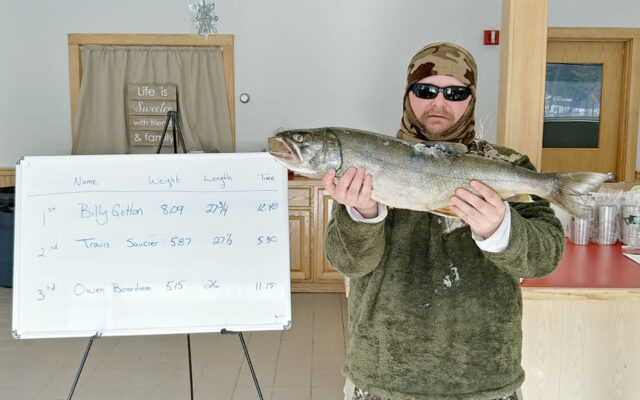
There are too many togue in Moosehead Lake
By Julie Harris, Bangor Daily News Staff
Fishermen need to keep the legal togue they catch from Moosehead if the lake is going to stay a healthy fishery, according to a state biologist.
Unpredictable ice conditions kept the winter’s lake trout, also known as togue, catch at about half what it normally is, and approximately 70 percent of the keepers were released back into Moosehead, regional fisheries supervisor Tim Aubrey said in his winter report.
Fishermen have a few reasons for releasing what they catch, one of which is to allow the big fish to get bigger, he said.
The poor ice fishing season plus fishermen’s tendency toward catch and release equals too many lake trout in Moosehead, and the food supply won’t sustain them.
The northern areas of the lake were slow to freeze and the ice began thinning in early March, keeping fishermen off that part of the lake, Aubrey said.
The health of the lake depends on fishermen taking between 3,000 and 4,000 togue under 18 inches each winter to make the food supply — smelt — sustainable. But the winter harvest was estimated at 1,800 togue, putting a strain on the smelt.
In 2008, the state removed the size and daily bag limits on lake trout to get the population down after a period of strict rules caused an explosion of the fish. Fishermen were releasing just 10-30 percent of the lake trout they caught, and many thousands were cleaned out of the lake, benefitting that species plus landlocked salmon and brook trout, he said.
Now, the regional biologist wants people to catch and keep the legal sizes to thin out the population so it won’t get that bad again.
“We need anglers to continue to harvest these lake trout under 18 inches. So, if you’re out and about on Moosehead Lake this summer or next winter, please consider harvesting a few more lake trout,†Aubrey said. The daily bag limit is five.
The winter ice woes weren’t all bad news. They also meant that fewer brook trout and salmon were caught, making it a much better spring fishing season for those fish, he said.